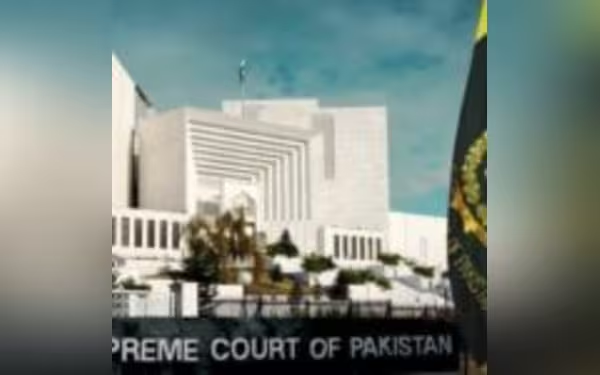Friday, October 4, 2024 10:37 AM
Supreme Court Allows Counting of Defectors' Votes in Pakistan
- Supreme Court annuls 2022 ruling on defection clause.
- Votes against party lines will now be counted.
- Ruling may alter political dynamics in Pakistan.
 Image Credits: pakistantoday
Image Credits: pakistantodaySupreme Court of Pakistan annuls 2022 ruling, allowing counting of votes from defectors, impacting political dynamics.
In a significant development, the Supreme Court (SC) of Pakistan has annulled its previous ruling from 2022 regarding the defection clause under Article 63-A of the Constitution. This decision, announced on Thursday, allows for the counting of votes from lawmakers who choose to vote against their party lines in future legislative matters. The ruling has sparked discussions about the implications for political stability and party loyalty in the country.
The Supreme Court's earlier verdict, delivered on May 17, 2022, had established that votes cast against the parliamentary party lines in specific situations—such as the election of the prime minister, chief minister, and during votes of confidence or no-confidence—would not be counted. This ruling was a response to a presidential reference filed by then-President Arif Alvi and was decided by a narrow 3-2 majority. The dissenting judges had warned that further interpretations of Article 63-A could lead to a misreading of the Constitution.
Now, with the recent ruling, the SC has opened the door for lawmakers to express their dissent without the fear of their votes being disregarded. This change could potentially alter the dynamics within the National Assembly, as it allows for greater individual expression among lawmakers, even if it goes against their party's stance.
The five-member bench, led by Chief Justice Qazi Faez Isa, resumed hearings on the review petitions filed by the Supreme Court Bar Association (SCBA), which was supported by the federal government and the Pakistan Peoples Party (PPP). During the proceedings, discussions arose regarding the participation of former Prime Minister Imran Khan via video link, highlighting the ongoing tensions between the judiciary and political figures.
Imran Khan's counsel, Ali Zafar, expressed concerns about the composition of the bench, suggesting a conflict of interest. The Chief Justice, however, emphasized the importance of adhering to legal protocols and maintaining respect within the courtroom. This exchange underscores the delicate balance between legal proceedings and political maneuvering in Pakistan.
As the legal landscape continues to evolve, the implications of this ruling will likely resonate throughout the political arena. Lawmakers may feel emboldened to vote according to their conscience, potentially leading to shifts in party dynamics and alliances. However, this newfound freedom also raises questions about accountability and the potential for political instability.
The Supreme Court's decision to count defectors' votes marks a pivotal moment in Pakistan's political history. It challenges the traditional notions of party loyalty and opens up avenues for more independent decision-making among lawmakers. As the nation watches closely, the long-term effects of this ruling will unfold, shaping the future of governance and political engagement in Pakistan.













